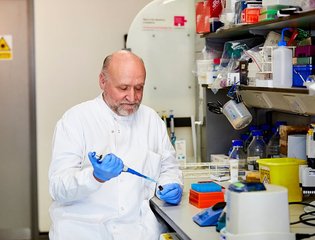Why are some ovarian cancer tumours particularly aggressive?

Professor Iain McNeish
Lead researcher: Professor Iain McNeish
Where: Ovarian Cancer Action Research Centre incorporating The Vivienne Wohl Unit
Theme: Treatment
All cancer cells contain specific mutations in their DNA that cause the cells to grow uncontrollably. Around 20-25% of women with ovarian cancer have tumours that contain mutations in a gene called PTEN. It’s thought that these tumours grow more rapidly and are less likely to respond to chemotherapy than those without PTEN mutations. Professor McNeish believes the patient’s own immune system holds the key to creating effective treatments specifically for these cancers.
When a woman gets ovarian cancer her immune system is alerted – immune cells flock to the tumour to attack and kill the cancer cells. Tumours that have a PTEN mutation have managed to outfox one specific type of immune cell called myeloid cells. Instead of attacking the tumour, the myeloid cells are attracted to the tumour and start to work for it. They feed the tumour cells, help the tumour to build a better blood supply and, most crucially, stop other immune cells from functioning properly, thus protecting the cancer from attack.
Professor McNeish and his team want to understand how PTEN-mutated tumours corrupt myeloid cells, and most importantly, how we can stop this from happening. At the end of this research project, Professor McNeish aims to take his research to a clinical trial in women with PTEN-mutated ovarian cancer using already available drugs. If successful, these trials will lead to better survival for women with these cancers.
Where are we now?
So far, Professor McNeish and his team have demonstrated that ovarian cancer tumours with a PTEN mutation are significantly more aggressive. They are starting to understand how and why these tumours attract different types of immune cells. Understanding the role the different types of immune cells play in supporting the tumour will be very important in the next few years of this research.


